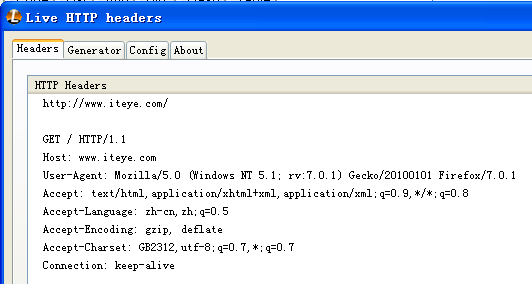HttpClient
1:概述
HttpClient是HttpComponents(简称为hc)项目其中的一部份,访问地址: http://hc.apache.org/

HttpClient是一个代码级的Http客户端工具,可以使用它模拟浏览器向Http服务器发送请求。使用HttpClient还需要HttpCore.后者包括Http请求与Http响应的代码封装。

2:HttpGet

httpcore:EntityUtils.toString(httpEntity)
读取response响应内容部分,也可以借助于 httpcore-4.1.2.jar 里面的
具体:
执行结果:

httpget.setHeader
1:分析请求包中这六个头信息

2:代码
3:效果

以上乱码是由于
注释掉这行,具体:
效果:

用post方法访问本地应用根据传递参数不同,返回不同结果
web.xml
Test1Servlet.java
Demo2.java
结果:

HttpClient是HttpComponents(简称为hc)项目其中的一部份,访问地址: http://hc.apache.org/

HttpClient是一个代码级的Http客户端工具,可以使用它模拟浏览器向Http服务器发送请求。使用HttpClient还需要HttpCore.后者包括Http请求与Http响应的代码封装。

2:HttpGet
public final static void main(String[] args) throws Exception {
HttpClient httpclient = new DefaultHttpClient();
try {
HttpGet httpget = new HttpGet("http://www.apache.org/");
System.out.println("executing request " + httpget.getURI());
HttpResponse response = httpclient.execute(httpget);
HttpEntity entity = response.getEntity();
System.out.println("----------------------------------------");
System.out.println(response.getStatusLine());
if (entity != null) {
System.out.println("Response content length: " + entity.getContentLength());
}
System.out.println("----------------------------------------");
InputStream inSm = entity.getContent();
Scanner inScn = new Scanner(inSm);
while (inScn.hasNextLine()) {
System.out.println(inScn.nextLine());
}
// Do not feel like reading the response body
// Call abort on the request object
httpget.abort();
} finally {
// When HttpClient instance is no longer needed,
// shut down the connection manager to ensure
// immediate deallocation of all system resources
httpclient.getConnectionManager().shutdown();
}
}

httpcore:EntityUtils.toString(httpEntity)
读取response响应内容部分,也可以借助于 httpcore-4.1.2.jar 里面的
String content = EntityUtils.toString(httpEntity);
具体:
/**
* User: liuwentao
* Time: 12-1-25 下午1:23
*/
public class Demo1 {
/**
* 用 get 方法访问 www.apache.org 并返回内容
*
* @param args
*/
public static void main(String[] args) {
//创建默认的 HttpClient 实例
HttpClient httpClient = new DefaultHttpClient();
try {
//创建 httpUriRequest 实例
HttpGet httpGet = new HttpGet("http://www.apache.org/");
System.out.println("uri=" + httpGet.getURI());
//执行 get 请求
HttpResponse httpResponse = httpClient.execute(httpGet);
//获取响应实体
HttpEntity httpEntity = httpResponse.getEntity();
//打印响应状态
System.out.println(httpResponse.getStatusLine());
if (httpEntity != null) {
//响应内容的长度
long length = httpEntity.getContentLength();
//响应内容
String content = EntityUtils.toString(httpEntity);
System.out.println("Response content length:" + length);
System.out.println("Response content:" + content);
}
//有些教程里没有下面这行
httpGet.abort();
} catch (Exception e) {
e.printStackTrace();
} finally {
//关闭连接,释放资源
httpClient.getConnectionManager().shutdown();
}
}
}
执行结果:

httpget.setHeader
1:分析请求包中这六个头信息

2:代码
/**
* @param args
* @throws IOException
*/
public static void main(String[] args) {
HttpClient httpClient = new DefaultHttpClient();
try {
HttpGet httpget = new HttpGet("http://www.iteye.com");
httpget.setHeader("Accept", "text/html,application/xhtml+xml,application/xml;q=0.9,*/*;q=0.8");
httpget.setHeader("Accept-Language", "zh-cn,zh;q=0.5");
httpget.setHeader("User-Agent", "Mozilla/5.0 (Windows NT 5.1; rv:7.0.1) Gecko/20100101 Firefox/7.0.1)");
httpget.setHeader("Accept-Encoding", "gzip, deflate");
httpget.setHeader("Accept-Charset", "GB2312,utf-8;q=0.7,*;q=0.7");
httpget.setHeader("Host", "www.iteye.com");
httpget.setHeader("Connection", "Keep-Alive");
HttpResponse response = httpClient.execute(httpget);
HttpEntity entity = response.getEntity();
System.out.println("----------------------------------------");
System.out.println(response.getStatusLine());
if (entity != null) {
System.out.println("Response content length: " + entity.getContentLength());
}
System.out.println("----------------------------------------");
InputStream inSm = entity.getContent();
Scanner inScn = new Scanner(inSm);
while (inScn.hasNextLine()) {
System.out.println(inScn.nextLine());
}
// Do not feel like reading the response body
// Call abort on the request object
httpget.abort();
} catch (Exception e) {
e.printStackTrace();
} finally {
// When HttpClient instance is no longer needed,
// shut down the connection manager to ensure
// immediate deallocation of all system resources
httpClient.getConnectionManager().shutdown();
}
}
3:效果

以上乱码是由于
httpget.setHeader("Accept-Encoding", "gzip, deflate");
注释掉这行,具体:
/**
* User: liuwentao
* Time: 12-1-25 下午1:23
*/
public class Demo3 {
/**
* 用 get 方法访问 www.baidu.com 并返回内容
*
* @param args
*/
public static void main(String[] args) {
//创建默认的 HttpClient 实例
HttpClient httpClient = new DefaultHttpClient();
try {
//创建 httpUriRequest 实例
HttpGet httpGet = new HttpGet("http://www.iteye.com");
httpGet.setHeader("Accept", "text/html,application/xhtml+xml,application/xml;q=0.9,*/*;q=0.8");
httpGet.setHeader("Accept-Language", "zh-cn,zh;q=0.5");
httpGet.setHeader("User-Agent", "Mozilla/5.0 (Windows NT 5.1; rv:7.0.1) Gecko/20100101 Firefox/7.0.1)");
// httpGet.setHeader("Accept-Encoding", "gzip, deflate");
httpGet.setHeader("Accept-Charset", "GB2312,utf-8;q=0.7,*;q=0.7");
httpGet.setHeader("Host", "www.iteye.com");
httpGet.setHeader("Connection", "Keep-Alive");
System.out.println("uri=" + httpGet.getURI());
//执行 get 请求
HttpResponse httpResponse = httpClient.execute(httpGet);
//获取响应实体
HttpEntity httpEntity = httpResponse.getEntity();
//打印响应状态
System.out.println(httpResponse.getStatusLine());
if (httpEntity != null) {
//响应内容的长度
long length = httpEntity.getContentLength();
//响应内容
String content = EntityUtils.toString(httpEntity);
System.out.println("Response content length:" + length);
System.out.println("Response content:" + content);
}
//有些教程里没有下面这行
httpGet.abort();
} catch (Exception e) {
e.printStackTrace();
} finally {
//关闭连接,释放资源
httpClient.getConnectionManager().shutdown();
}
}
}
效果:

用post方法访问本地应用根据传递参数不同,返回不同结果
web.xml
<servlet>
<servlet-name>Test1Servlet</servlet-name>
<servlet-class>demo.servlet.Test1Servlet</servlet-class>
</servlet>
<servlet-mapping>
<servlet-name>Test1Servlet</servlet-name>
<url-pattern>/test1Servlet</url-pattern>
</servlet-mapping>
Test1Servlet.java
/**
* User: liuwentao
* Time: 11-12-25 下午1:08
*/
public class Test1Servlet extends HttpServlet {
@Override
protected void doPost(HttpServletRequest request, HttpServletResponse response)
throws ServletException, IOException {
//接收地址栏参数
String param1 = request.getParameter("param1");
//输出
response.setContentType("text/html;charset=UTF-8");
PrintWriter out = response.getWriter();
out.write("你传递来的参数param1=" + param1);
out.close();
}
}
Demo2.java
/**
* User: liuwentao
* Time: 12-1-25 下午1:23
*/
public class Demo2 {
/**
* 用post方法访问本地应用根据传递参数不同,返回不同结果
*
* @param args
*/
public static void main(String[] args) {
//创建默认的 HttpClient 实例
HttpClient httpClient = new DefaultHttpClient();
HttpPost httpPost = new HttpPost("http://localhost:86/test1Servlet");
List<NameValuePair> formParams = new ArrayList<NameValuePair>();
formParams.add(new BasicNameValuePair("param1", "刘文涛"));
UrlEncodedFormEntity urlEncodedFormEntity;
try {
urlEncodedFormEntity = new UrlEncodedFormEntity(formParams, "UTF-8");
httpPost.setEntity(urlEncodedFormEntity);
System.out.println("execurting request:" + httpPost.getURI());
HttpResponse httpResponse = null;
httpResponse = httpClient.execute(httpPost);
HttpEntity httpEntity = httpResponse.getEntity();
if (httpEntity != null) {
String content = EntityUtils.toString(httpEntity, "UTF-8");
System.out.println("Response content:" + content);
}
} catch (ClientProtocolException e) {
e.printStackTrace();
} catch (UnsupportedEncodingException e) {
e.printStackTrace();
} catch (IOException e) {
e.printStackTrace();
} finally {
//关闭连接,释放资源
httpClient.getConnectionManager().shutdown();
}
}
}
结果:
